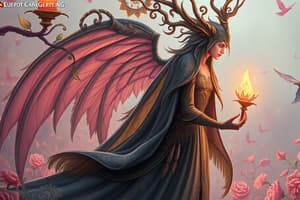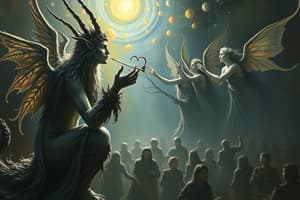Podcast
Questions and Answers
Which operatic genre is NOT typically associated with Mozart's compositions?
Which operatic genre is NOT typically associated with Mozart's compositions?
- Opera Verismo (correct)
- Opera Seria
- Opera Buffa
- Singspiel
The Magic Flute is an example of opera seria, characterized by its focus on historical or mythological subjects.
The Magic Flute is an example of opera seria, characterized by its focus on historical or mythological subjects.
False (B)
Name the librettist with whom Mozart collaborated on The Marriage of Figaro and Don Giovanni.
Name the librettist with whom Mozart collaborated on The Marriage of Figaro and Don Giovanni.
Lorenzo Da Ponte
Mozart's opera Così fan tutte explores the complexities of love and _________ through its playful plot.
Mozart's opera Così fan tutte explores the complexities of love and _________ through its playful plot.
Match each Mozart opera with its distinguishing characteristic:
Match each Mozart opera with its distinguishing characteristic:
Which composer did Mozart NOT directly influence?
Which composer did Mozart NOT directly influence?
Mozart's symphonies remained static throughout his career and strictly adhered to the Italian sinfonia form.
Mozart's symphonies remained static throughout his career and strictly adhered to the Italian sinfonia form.
Mozart's piano concertos are celebrated for their elegance, virtuosity, and interplay between the soloist and what other musical group?
Mozart's piano concertos are celebrated for their elegance, virtuosity, and interplay between the soloist and what other musical group?
Besides symphonies and concertos, Mozart made significant contributions to _________ music, composing string quartets and quintets.
Besides symphonies and concertos, Mozart made significant contributions to _________ music, composing string quartets and quintets.
Match the musical genre with Mozart's notable contribution:
Match the musical genre with Mozart's notable contribution:
In what city and year was Mozart born?
In what city and year was Mozart born?
Mozart exclusively served as Konzertmeister in Vienna throughout his entire career.
Mozart exclusively served as Konzertmeister in Vienna throughout his entire career.
Besides Wolfgang, what was the name of Mozart's sister, who also toured Europe with him and their father?
Besides Wolfgang, what was the name of Mozart's sister, who also toured Europe with him and their father?
In 1782, Mozart married _________ Weber, with whom he had six children.
In 1782, Mozart married _________ Weber, with whom he had six children.
Match the year with the corresponding biographical event in Mozart's life:
Match the year with the corresponding biographical event in Mozart's life:
Which of the following is NOT identified as a characteristic of Mozart's operas?
Which of the following is NOT identified as a characteristic of Mozart's operas?
Mozart's relationship with his father Leopold was consistently harmonious and without conflict.
Mozart's relationship with his father Leopold was consistently harmonious and without conflict.
What instrument did Mozart play from an early age, alongside the keyboard?
What instrument did Mozart play from an early age, alongside the keyboard?
Mozart's early travels exposed him to different musical styles and cultures, shaping his _________ outlook.
Mozart's early travels exposed him to different musical styles and cultures, shaping his _________ outlook.
Match the opera with its description:
Match the opera with its description:
Flashcards
Opera Seria
Opera Seria
A dramatic operatic genre, dealing with serious subjects.
Opera Buffa
Opera Buffa
A comic operatic genre, often satirizing social classes.
Singspiel
Singspiel
German opera with spoken dialogue, not just singing.
The Marriage of Figaro
The Marriage of Figaro
Signup and view all the flashcards
Don Giovanni
Don Giovanni
Signup and view all the flashcards
Così fan tutte
Così fan tutte
Signup and view all the flashcards
The Magic Flute
The Magic Flute
Signup and view all the flashcards
Mozart's Operatic Melodies
Mozart's Operatic Melodies
Signup and view all the flashcards
Ensembles in Mozart's Operas
Ensembles in Mozart's Operas
Signup and view all the flashcards
Mozart's Orchestration
Mozart's Orchestration
Signup and view all the flashcards
Mozart's Psychological Insight
Mozart's Psychological Insight
Signup and view all the flashcards
Qualities of Mozart's Music
Qualities of Mozart's Music
Signup and view all the flashcards
Mozart's Piano Concertos
Mozart's Piano Concertos
Signup and view all the flashcards
Mozart's Chamber Music
Mozart's Chamber Music
Signup and view all the flashcards
Mozart's Innovations
Mozart's Innovations
Signup and view all the flashcards
Joseph Haydn
Joseph Haydn
Signup and view all the flashcards
Franz Schubert
Franz Schubert
Signup and view all the flashcards
Ludwig van Beethoven
Ludwig van Beethoven
Signup and view all the flashcards
Salzburg
Salzburg
Signup and view all the flashcards
Requiem
Requiem
Signup and view all the flashcards
Study Notes
- Wolfgang Amadeus Mozart, born in Salzburg in 1756 and died in Vienna in 1791, was a prolific and influential composer of the Classical period
Operatic Contributions
- Mozart's operas are a cornerstone of the operatic repertoire, showcasing his dramatic and musical genius
- He composed in various operatic genres, including opera seria, opera buffa, and Singspiel, demonstrating versatility
- His major operas include:
- The Marriage of Figaro (Le nozze di Figaro) (1786): An opera buffa that explores social themes and human relationships with complex characters
- Don Giovanni (1787): A dramma giocoso blending comedy and tragedy in the story of a libertine nobleman
- Così fan tutte (1790): An opera buffa that examines the complexities of love and fidelity through a playful plot
- The Magic Flute (Die Zauberflöte) (1791): A Singspiel, which includes spoken dialogue, that mixes fantasy and Masonic symbolism with themes of enlightenment and virtue
- Mozart's operas are characterized by:
- Memorable melodies and arias that express a wide range of emotions
- Complex ensembles, such as duets, trios, and quartets, that advance the plot and reveal character interactions
- Orchestral writing that enhances the drama and provides color and texture
- Keen psychological insight into his characters, making them believable and relatable
- A perfect balance between music and drama, creating a seamless and engaging theatrical experience
- The Marriage of Figaro is noted for its social commentary and ensemble writing, reflecting Mozart’s innovative approach to opera buffa
- Don Giovanni is a dark comedy that explores moral ambiguity and features some of Mozart's most dramatic music
- The Magic Flute demonstrates Mozart's ability to blend popular entertainment with profound philosophical ideas
Musical Influence
- Mozart's influence on subsequent composers is immense, and his works have served as models of classical form and style
- Composers influenced by Mozart include:
- Ludwig van Beethoven, who admired Mozart's music and was likely taught by him briefly
- Joseph Haydn, a close friend and mentor whose symphonies and quartets influenced Mozart's development
- Franz Schubert, who continued Mozart's tradition of lyrical melodies and dramatic expression
- Mozart's contributions to various musical genres include:
- Symphonies: He wrote over 40 symphonies, which evolved from the Italian sinfonia to more complex and expressive forms
- Concertos: His piano concertos are particularly celebrated for their elegance, virtuosity, and interplay between soloist and orchestra
- Chamber music: He composed string quartets, quintets, and other chamber works that are models of classical balance and refinement
- Church music: He wrote masses, motets, and other sacred works that reflect his religious faith and musical mastery
- His innovative use of form, harmony, and orchestration expanded the possibilities of classical music
- Mozart's music is admired for its clarity, balance, and emotional depth, appealing to audiences across generations
- His melodic gift is unparalleled, with tunes that are both memorable and expressive
- His understanding of instrumental capabilities allowed him to write music that is both challenging and idiomatic
Biographical Milestones
- 1756: Born in Salzburg, Austria, on January 27, to Leopold Mozart, a composer and violinist, and Anna Maria Pertl
- Early Childhood: Displayed prodigious musical talent from an early age, playing the keyboard and violin, and composing his first works at age 5
- 1762-1773: Toured Europe with his father and sister Maria Anna (Nannerl), performing for royalty and nobility in cities such as Vienna, Paris, London, and Rome
- 1769-1781: Served as Konzertmeister at the Salzburg court, but grew increasingly frustrated with the limited opportunities and restrictions
- 1781: Moved to Vienna in pursuit of a freelance career, teaching, performing, and composing for various patrons
- 1782: Married Constanze Weber, with whom he had six children, though only two survived infancy
- 1786-1790: Achieved great success with his operas The Marriage of Figaro, Don Giovanni, and Così fan tutte, collaborating with the librettist Lorenzo Da Ponte on the first two
- 1791: Composed The Magic Flute and the Requiem, which was left unfinished at his death
- December 5, 1791: Died in Vienna at the age of 35, with the cause of death remaining a subject of speculation
- Mozart's early travels exposed him to different musical styles and cultures, shaping his cosmopolitan outlook
- His relationship with his father was complex, marked by both support and control
- His marriage to Constanze Weber was loving but often strained by financial difficulties
- Despite his fame, Mozart struggled to secure a stable position in Vienna, relying on commissions and performances for income
- The circumstances surrounding his death have been shrouded in mystery, leading to various legends and theories
Studying That Suits You
Use AI to generate personalized quizzes and flashcards to suit your learning preferences.




